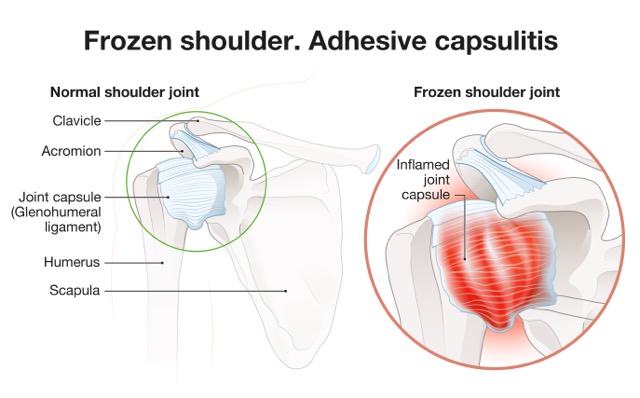Table of Contents
Introduction
If you’ve ever felt pain and stiffness in your shoulder that made it hard to move your arm, you may have had what’s called frozen shoulder. It’s a painful condition that can make it hard to do simple activities like reaching up to get a dish from a cupboard or comb your hair and it can last for months or even years if left untreated. Let’s look at everything you need to know about frozen shoulder from what causes it, to how it’s treated.
What is Frozen Shoulder?
Frozen shoulder, also known as adhesive capsulitis, is a condition characterized by pain and stiffness in the shoulder. The shoulder is a ball-and-socket joint; frozen shoulder occurs when the tendons and ligaments that connect the shoulder blade to the upper arm bone (the humerus) become inflamed and thickened. This inflammation and thickening can cause the shoulder joint to freeze up, making it difficult to move the arm.
Frozen shoulder typically comes on gradually and can last for months or even years. The condition is more common in women than men and typically occurs in people over the age of 40.
Symptoms of Frozen Shoulder
The main symptom of frozen shoulder is pain, which can range from mild to severe. The pain is often worse at night and it may make it difficult to sleep on the affected side. Other symptoms include:
- Stiffness in the shoulder.
- Limited range of motion in the shoulder.
- Aching or throbbing in the shoulder.
- Weakness in the arm.
- Inability to lift the arm above the head or behind the back.
- An inability to fully rotate the arm.
- Severe pain when moving the arm.

Causes of Frozen Shoulder: Risk Factors
Multiple factors can contribute to the development of frozen shoulder, including:
- Age: Frozen shoulder is more common in people that are over the age of 40 due to the natural deterioration of the shoulder joint that occurs with age.
- Inactivity: Frozen shoulder is more likely to occur in people who have sustained an injury to the shoulder or who have had surgery on the shoulder. It is also more common in people who have a sedentary lifestyle.
- Diabetes: People with diabetes are more likely to develop frozen shoulder due to the increased risk of nerve damage and inflammation associated with the condition.
- Other medical conditions: Frozen shoulder is also more common in people with thyroid disease, Parkinson’s disease, and cardiovascular disease due to the increased risk of inflammation and nerve damage associated with these conditions.
There are also several risk factors that can increase your chances of developing frozen shoulder, including:
- Gender: Women are more likely to develop frozen shoulder than men.
- Shoulder surgery: Having surgery on the shoulder, such as rotator cuff surgery, can increase your risk of developing frozen shoulder.
- Shoulder injury: Sustaining an injury to the shoulder, such as a dislocation or a fracture, can increase your risk of developing frozen shoulder.
Diagnosis of Frozen Shoulder
Frozen shoulder is typically diagnosed based on a physical examination and a review of your medical history. Our doctors will ask about your symptoms and will check for any pain or limited range of motion in your shoulder. They may also order imaging tests, such as an x-ray or MRI, to rule out other conditions that could be causing your symptoms.
Reoccurrence and Prevention
Preventing frozen shoulder is difficult, as the exact cause varies. In general, a healthy lifestyle and good shoulder care can help to minimize the risks by keeping the shoulder muscles and joints healthy and mobile.
Some cases of frozen shoulder may be prevented by avoiding activities that put unnecessary stress on the shoulder, such as heavy lifting. Additionally, maintaining good posture and range of motion in the shoulder can help to keep it healthy and reduce the likelihood of developing frozen shoulder.
Testimonials
Looking to schedule an appointment with a physician?
Schedule an appointment with us by calling (916) 961-3434 or by clicking the button below to begin requesting your appointment today!

